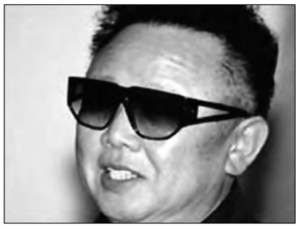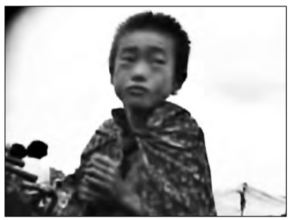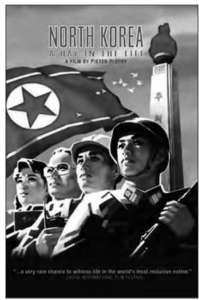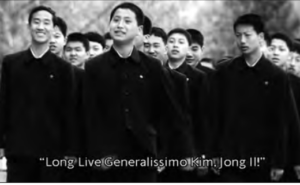THE REAL DR. EVIL
DIRECTED BY ROB LEMKIN
A BBCW PRODUCTION
DISTRIBUTED BY FILMS FOR THE HUMANITIES
AND SCIENCES
DVD, VHS AND DIGITAL
ON-DEMAND, 46 MINUTES, COLOR, 2003
CHILDREN OF THE SECRET STATE:
NORTH KOREA
PRODUCED AND DIRECTED
BY CARLA GARAPEDIAN
NARRATED BY JOE LAYBURN
HARDCASH PRODUCTIONS, LONDON, ENGLAND
DVD, 46 MINUTES, COLOR, 2000
NORTH KOREA: A DAY IN THE LIFE
PRODUCED AND DIRECTED BY PIETER FLEURY
DISTRIBUTED BY FACETS MULTIMEDIA
DVD, 48 MINUTES, COLOR, 2004
ENGLISH SUBTITLES
A STATE OF MIND
PRODUCED AND DIRECTED BY DANIEL GORDON
DISTRIBUTED BY KINO INTERNATIONAL
DVD, 94 MINUTES, COLOR, 2003
ENGLISH SUBTITLES
North Korea presents an irresistible target for Western, and especially American, mass media. Typical media images of North Korea range from goose-stepping soldiers in military parades to grainy shots of starving children. Often, media images alternate between evocations of fear and of ridicule. But most often they focus on Kim Jong Il, the North Korean leader variously described as a playboy, a madman, a ruthless dictator, and (by George W. Bush) a “pygmy.” With every launch of a missile and, most recently, testing of a nuclear weapon, Kim’s face makes the covers of Time, Newsweek, and the Economist, usually sporting strange and overly large sunglasses. With a mass media that sensationalizes even the most banal and trivial events, North Korea is almost too good to be true.
What we rarely see in any of the common media representations are images of the everyday lives of ordinary North Koreans. In the last two or three years, a few television and feature filmmakers have tried to document real life in this isolated and carefully controlled society. In late 2006, for example, Diane Sawyer (who happened to be in North Korea at the time of the October 9, nuclear test) gave a wide-eyed-American-girl-inPyongyang report for ABC television, with mixed results. Three of the four films reviewed here attempt to get below the surface and reveal everyday life in the Democratic People’s Republic of Korea, in various ways and to varied degrees of success.

The one film that does not dig into ordinary lives, the BBC’s The Real Dr. Evil, exemplifies many of the problems with media coverage of North Korea, beginning with its title (shouldn’t Mike Myers, creator of the Austin Powers films, own the copyright on the “Dr. Evil” name?). Focusing on the sinister and the absurd, The Real Dr. Evil plays up to every stereotype and sensationalistic tidbit related to Kim Jong Il, however tenuously these may be supported by the facts. A psychological profiler for the CIA, for example, explains how Kim’s alleged murder of his younger brother, who drowned when they were young boys, may have affected Kim’s personality and leadership style. A defector describes Kim’s poor attendance and on-time record at Kim Il Sung University, clearly a foretaste of evil to come. The kidnapping of South Korean film director Shin Sang-ok and his wife Choi Eun-hee is described as having “never been fully understood,” which puts it mildly indeed. The ongoing intelligence battles and low-intensity conflict between North and South Korea is never explained; as in the James Bond film Die Another Day, South Korea itself barely registers except as a victim of North Korean violence and perfidy. North Korea and Kim Jong Il personally may indeed be responsible for some unsavory and even heinous actions, but armchair psychologizing and close-ups of Kim’s beady eyes will do little to help us understand them.

©2000 Hardcash Productions
Children of the Secret State focuses on another image of North Korea, that of starving children brutalized by famine and the oppressiveness of the North Korean regime. Much of the footage was shot secretly and at great personal risk by North Koreans who fled to China. The film makes for grim viewing and is not recommended for younger children. For high school and college students, the film can serve as an important starting point for a discussion of the politics surrounding the North Korean famine of the late 1990s and the country’s continued economic problems, which are not unrelated to the nuclear crisis between North Korea and the US.

©2004 Golden Monkey Enterprises
The fascinating 2004 Dutch television documentary North Korea: A Day in the Life, made “under the guidance of the Ministry of Culture, Democratic People’s Republic of Korea,” lets North Koreans speak for themselves. It is unlikely that foreign audiences will interpret the North Koreans quite as the Ministry of Culture intended. The film follows several people of various ages and occupations around Pyongyang. A child goes to kindergarten and is lectured at length about the glorious (and entirely fictional) childhood exploits of Kim Jong Il at his father’s “revolutionary base camp” on the slopes of Mt. Paektu; on the way to school her mother sings songs with her about how “our great People’s Army shakes heaven and earth, making the American dogs tremble.” School corridors are festooned with drawings of North Korean missiles and soldiers crushing Americans. Women are working at a textile factory when the electricity goes out, interrupting a recorded song about the Great Leader; the blackout is blamed, as usual, on the American imperialists. The strange and the ordinary co-exist without comment; this is everyday life in North Korea, at least in the capital, and the film should be commended for its intimate, straightforward glimpse into that life.

©2004 Very Much So/Passion Pictures
 A State of Mind, by the British filmmaker Daniel Gordon, stands far above the rest. It is not only superior to the other films reviewed here, but to virtually every other documentary made about North Korea, with the exception of Gordon’s own previous film The Game of Their Lives, which concerned the 1966 North Korean soccer team that astonished the world by making it to the quarter-finals of the World Cup in Britain. A State of Mind appears to be the second part of a trilogy that will conclude with a film about four American soldiers who defected to North Korea in the 1960s.
A State of Mind, by the British filmmaker Daniel Gordon, stands far above the rest. It is not only superior to the other films reviewed here, but to virtually every other documentary made about North Korea, with the exception of Gordon’s own previous film The Game of Their Lives, which concerned the 1966 North Korean soccer team that astonished the world by making it to the quarter-finals of the World Cup in Britain. A State of Mind appears to be the second part of a trilogy that will conclude with a film about four American soldiers who defected to North Korea in the 1960s.
In 2003, Gordon, his producer Nicholas Bonner, and cameraman Nick Bennett were given unprecedented access to film two Pyongyang families, who both had daughters training for the Mass Games, North Korea’s extraordinary showpiece sport that combines theatre, gymnastics, and thousands of audience members creating enormous propaganda images with hand-held signs. The film takes the girls through months of grueling training for the games, shows their families at home, work, play, and school, and interviews several family members at length. We also get a glimpse of the countryside outside of Pyongyang when we visit the friend of one of the girl’s fathers. The climax of the film is the girls’ performance at the Mass Games, which is breathtaking. Whether one sees the Mass Games as a confirmation of North Korea’s uncompromising social solidarity (as the North Koreans apparently believe) or as a chilling representation of the most extreme totalitarian regime of our times, the games are undeniably impressive. A State of Mind is a first-rate documentary; as a glimpse of life in North Korea, it has no peer.

